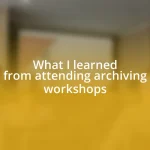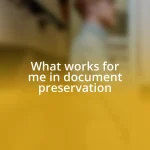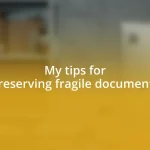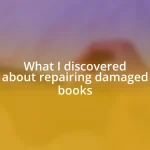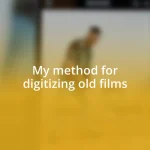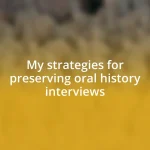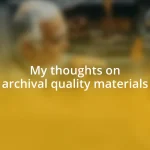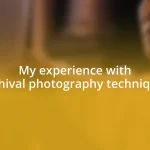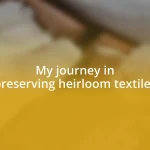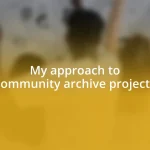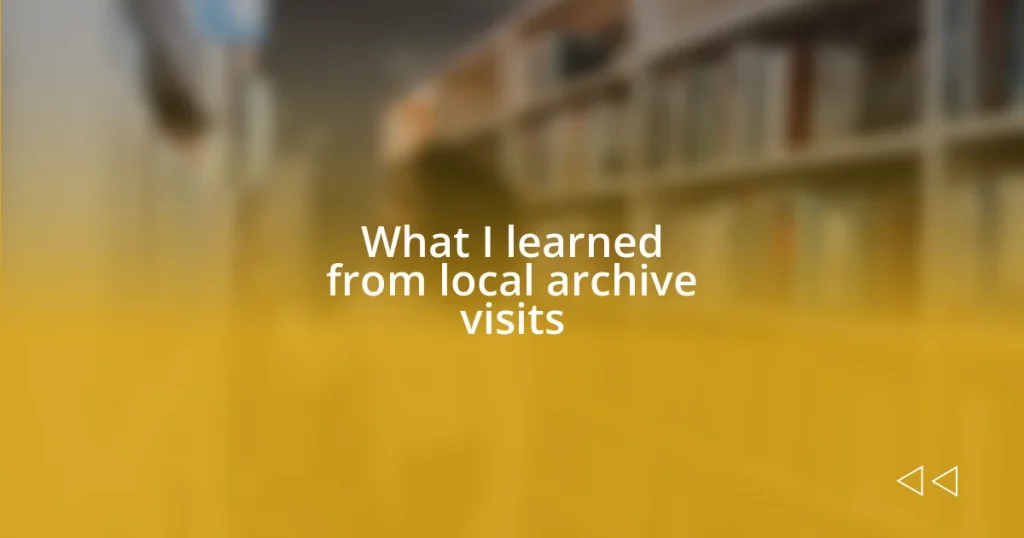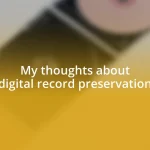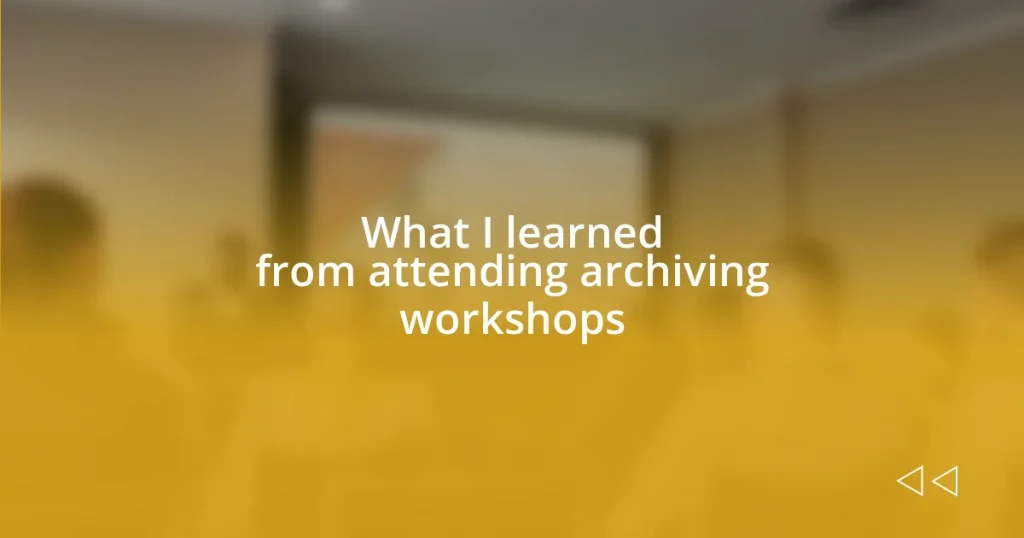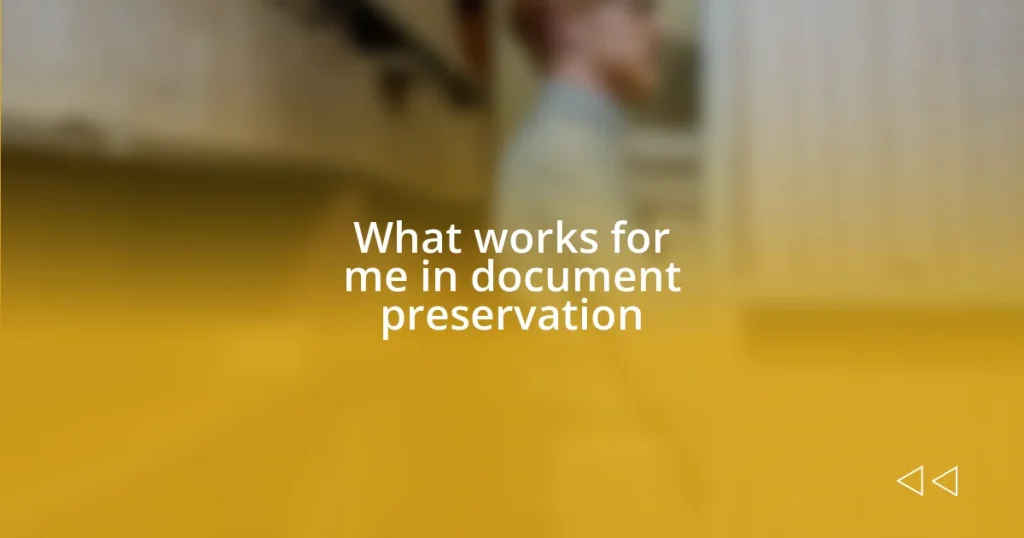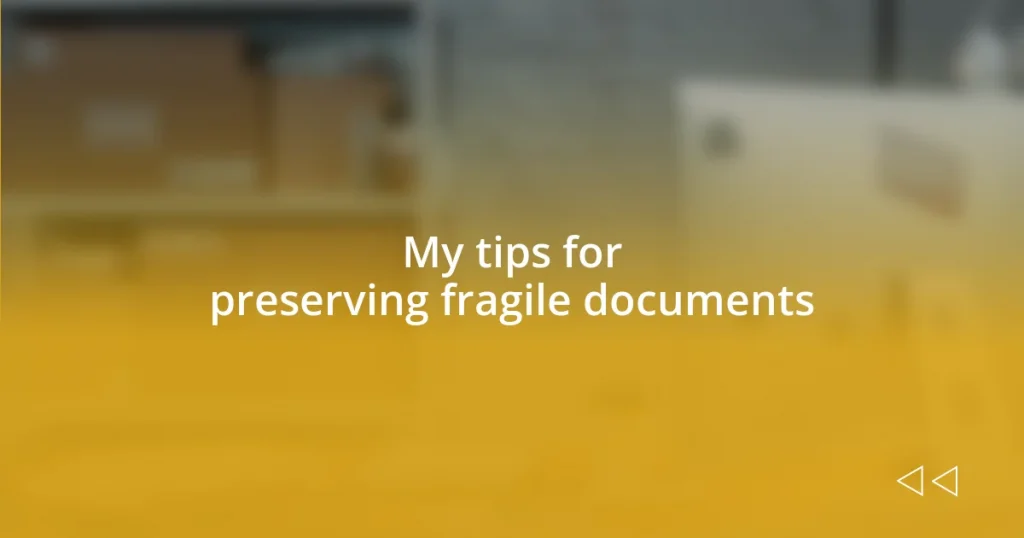Key takeaways:
- Local archives serve as vital repositories of historical documents, enabling personal connections to community heritage and family narratives.
- Preparing for an archive visit by identifying specific materials and consulting with archivists can significantly enhance the research experience and lead to unexpected discoveries.
- Sharing findings with the community not only reinforces personal understanding of history but also fosters connections and ignites curiosity among others about their own heritage.
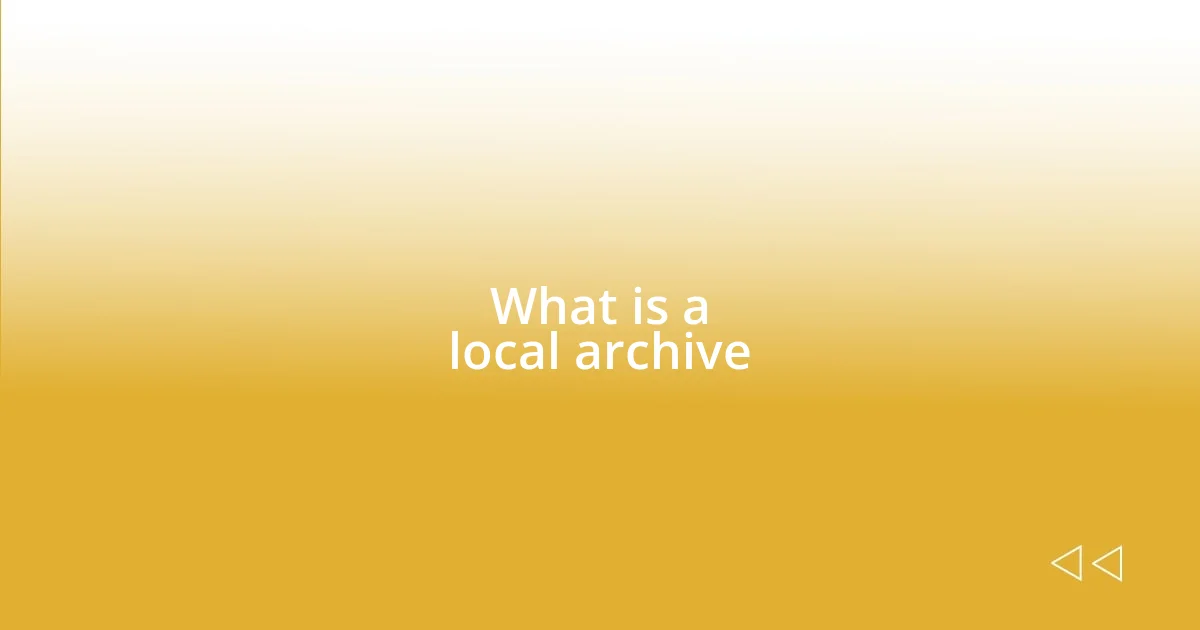
What is a local archive
Local archives are treasure troves of historical documents, photographs, and records that shine a light on community heritage. They often house items like birth certificates, property deeds, and personal letters that document the lives of those who lived in the area long before us. Have you ever stumbled upon a dusty box of family photos? That feeling of connection to the past is exactly what local archives offer — a glimpse into the stories that shaped our communities.
I remember my first visit to a local archive; it felt like stepping back in time, discovering a world full of untold stories just waiting to be shared. I was fascinated by a handwritten letter from a resident during the Great Depression, detailing the struggles of that era. This letter didn’t just exist as a piece of paper; it was a portal allowing me to feel the weight of their emotions. How incredible is it that these archives give us a chance to engage with such profound moments in history?
My interactions with archivists have also taught me that local archives are not merely repositories of information; they are lively centers of learning and discovery. These passionate individuals often share their own insights and stories, sparking curiosity about the artifacts we might otherwise overlook. Have you ever asked an archivist about a particular document? Their enthusiasm can be infectious, and you leave feeling inspired by the histories that are so deeply interwoven with our lives.
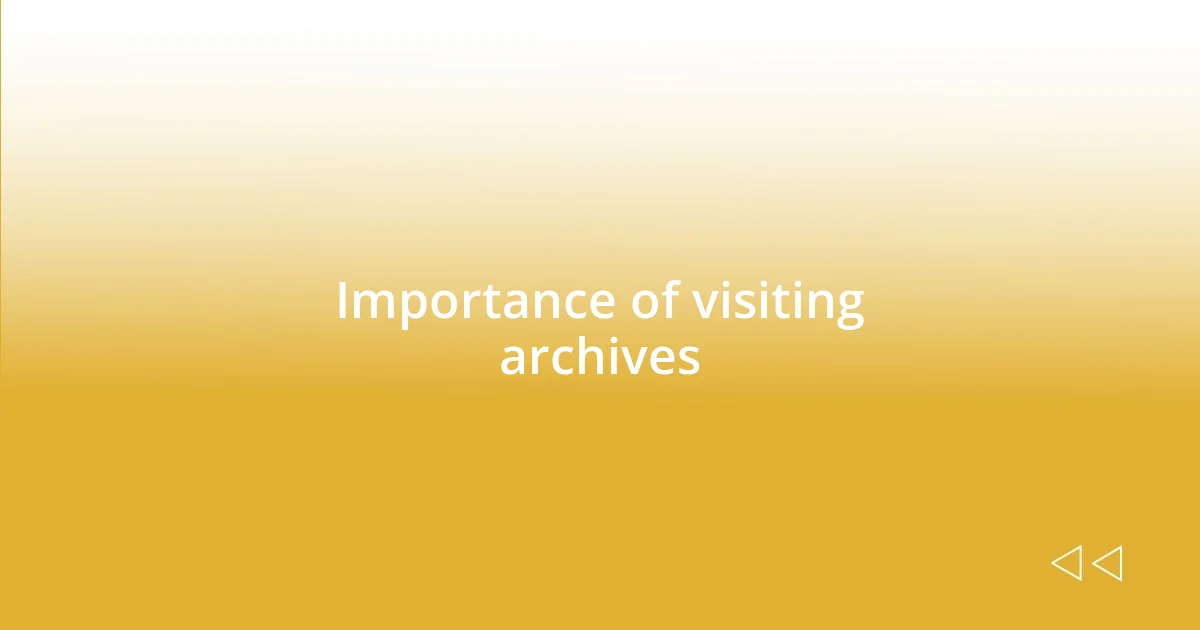
Importance of visiting archives
Visiting archives holds immense importance, offering a unique opportunity to connect personally with history. For me, each visit feels like uncovering a piece of my own family’s narrative. When I discovered a newspaper article from the 1940s about my grandparents’ small business, it felt surreal. It was as if I was piecing together fragments of their lives, creating a tapestry of experiences that went far beyond mere facts.
Here are some key reasons why visiting archives is invaluable:
- Preservation of History: Archives safeguard documents that may otherwise deteriorate, ensuring access for future generations.
- Community Connection: They deepen our understanding of local history, revealing how places we know today once thrived and transformed.
- Personal Discovery: Records like old letters or photographs can spark emotional connections, bringing our ancestors’ stories to life in a profoundly personal way.
- Access to Unique Resources: Unlike general libraries, local archives often contain specialized materials, providing rich insights into specific events or eras.
- Engagement with Experts: Interacting with archivists can lead to unexpected discoveries and insights that enrich our research.
Every visit leaves me with new perspectives and deeper appreciation for the people and events that have shaped our communities. It’s a reminder that history isn’t just about dates and events; it’s also about the lives lived and stories told.
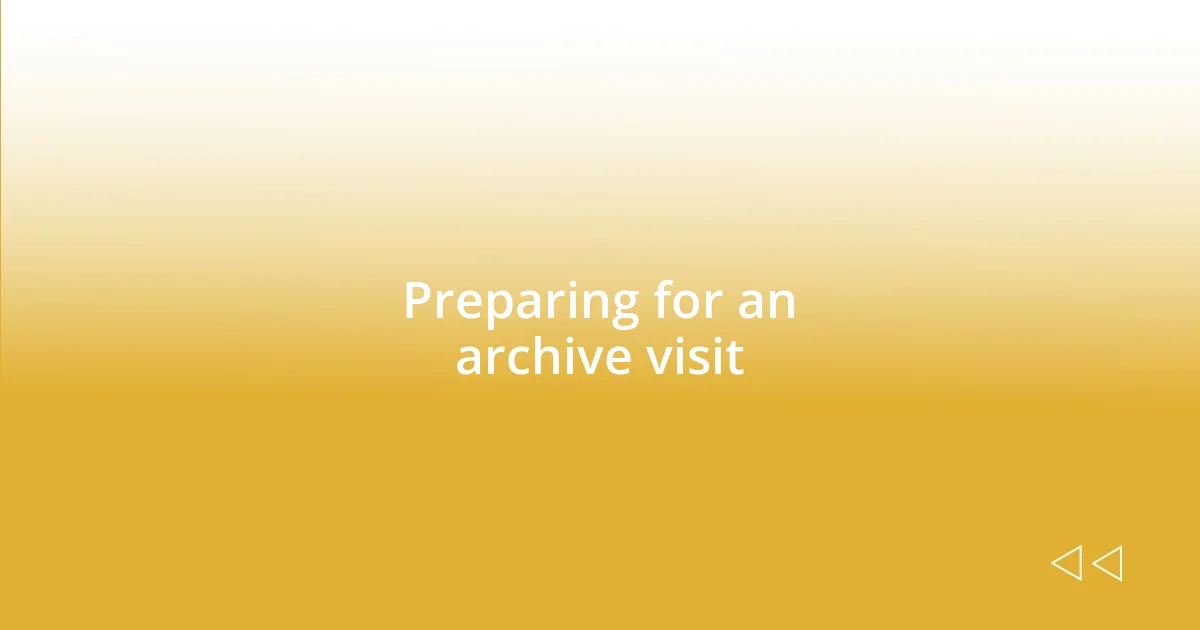
Preparing for an archive visit
Preparing for an archive visit is an exciting endeavor, but a bit of planning can enhance the experience immensely. I usually start by determining the specific materials I want to explore, such as family records or local history documents. This targeted approach helps me stay focused and makes the visit feel more rewarding—like hunting for hidden gems rather than wandering aimlessly.
When I visited a local archive last summer, I learned the importance of checking their catalog in advance. I was eagerly looking for documents related to an old family farm, but I discovered too late that the archives had a limited collection on that subject. If I had done a bit of research beforehand, I could have tailored my visit to include other related materials, such as agricultural records or community event flyers. Preparing in advance doesn’t just save time; it can also lead to richer discoveries.
Additionally, I strongly recommend reaching out to the archivists before visiting. When I contacted an archivist about accessing a specific collection, not only did they reserve materials for me, but they also shared unexpected leads and connections I hadn’t considered. Their expertise added layers to my research, sparking curiosity that I couldn’t have uncovered on my own. This proactive approach turned an ordinary visit into a delightful learning adventure.
| Preparation Step | Benefits |
|---|---|
| Identify Specific Materials | Focus and efficiency during your visit |
| Check Catalog in Advance | Avoid wasting time on unrelated collections |
| Contact Archivists | Gain expert insights and potential leads |
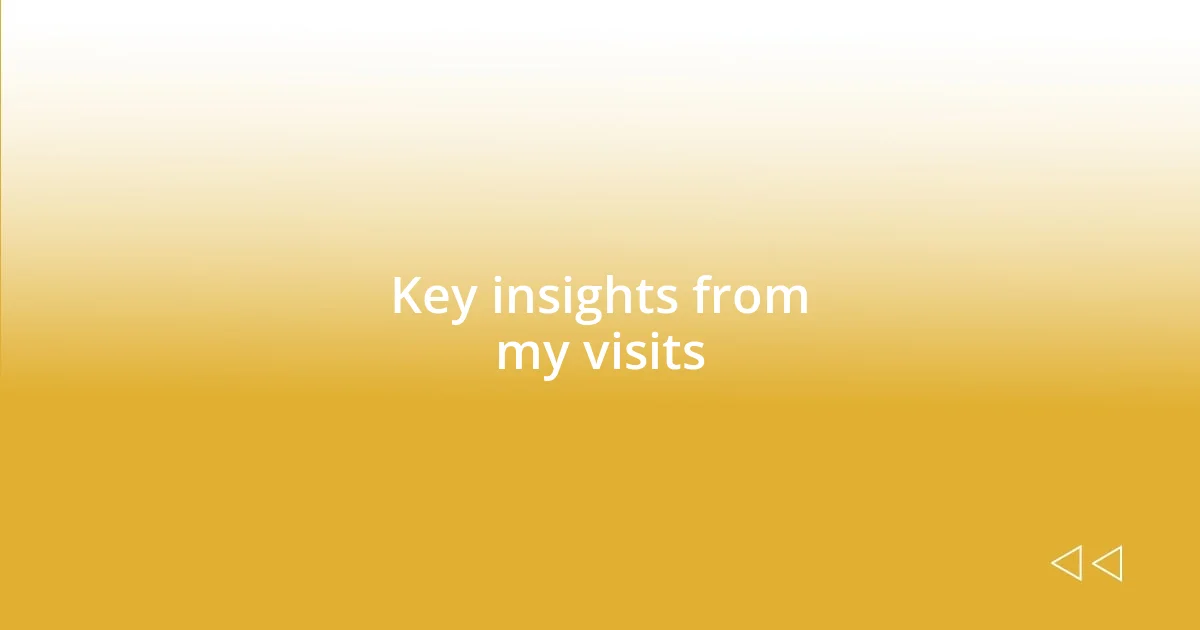
Key insights from my visits
During my visits to local archives, I’ve often found that the tiniest details can evoke powerful emotions. For instance, while sifting through a box of handwritten letters from the early 1900s, I stumbled upon a love letter that my great-grandmother had written to my great-grandfather. Reading her words filled me with a sense of connection that made me see my family’s history in a whole new light. How often do we come across such intimate glimpses into the past? It’s moments like these that underscore the personal relevance of historical records.
Another insight I’ve gained is the sheer diversity of materials available in local archives. I distinctly remember a visit where I was exploring digitized maps from a century ago. The sheer intricacy of those maps revealed how much the town had transformed over the decades. It got me thinking: how differently do we perceive our surroundings today compared to our ancestors? This journey through time not only enhances my understanding of local history but also encourages a deeper appreciation for the changes we often take for granted.
Finally, I can’t emphasize enough the value of conversations with archivists. On one visit, I had a spontaneous chat with an archivist who pointed me toward a collection of oral histories from residents. Hearing their stories instantly brought history to life in ways I never anticipated. I remember asking her, “What do you think is the most surprising thing you’ve found in the archives?” Her insights about forgotten local legends revealed a rich tapestry of narratives that fueled my curiosity. Have you ever considered how these one-on-one interactions can illuminate hidden facets of history? They truly transform an ordinary archive visit into a historical treasure hunt.
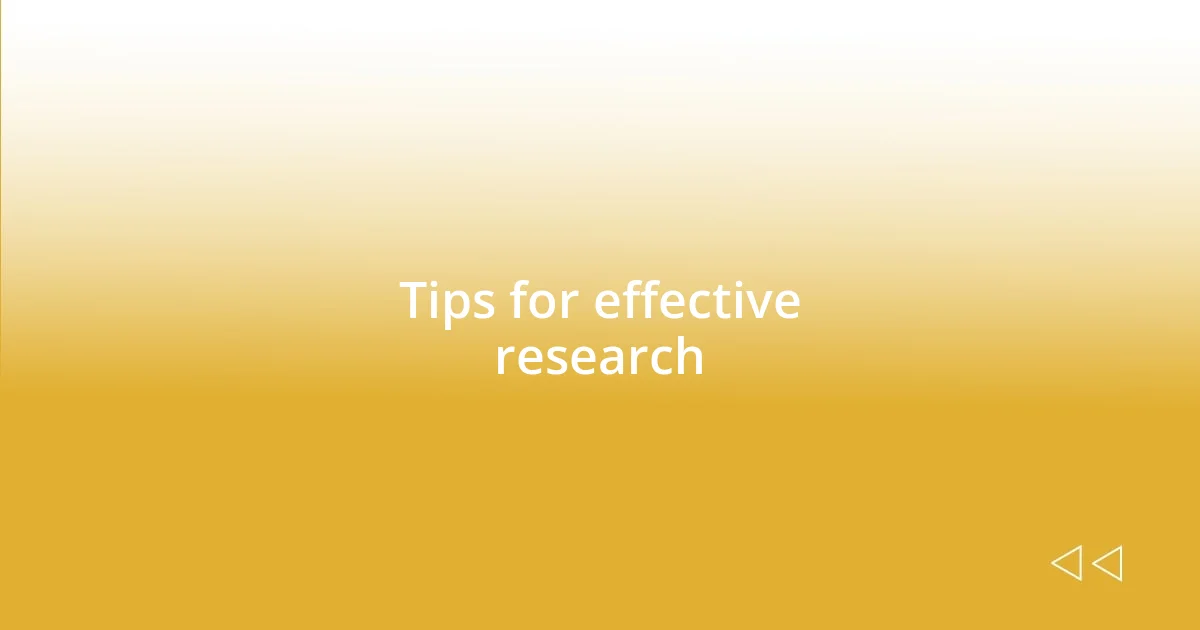
Tips for effective research
Engaging with local archives requires more than just a casual visit; it’s about building a strategy that resonates with your research goals. A trick I often use is to create a checklist of documents or themes I want to explore. This way, instead of becoming overwhelmed by the wealth of information, I can dive straight into what matters most to me. Have you tried something similar? I find that having a checklist not only keeps me organized but also mentally prepares me for what I might uncover.
Another vital tip is to stay flexible during your research. I remember a time when I was searching for specific city council meeting notes but instead stumbled across a collection of neighborhood newsletters. Initially frustrated, I decided to browse them anyway and ended up discovering vibrant stories about community events that related to my original research. It’s a reminder that the unexpected can lead to the most delightful discoveries. Have you ever let curiosity take you off your planned path? Sometimes, those detours can be the most rewarding!
Lastly, I urge you to keep detailed notes while you research. I once filled an entire notebook with observations and personal reflections during a visit to an archive focused on immigration records. Looking back, those notes helped me craft a much richer narrative for my family history. How often do we rely on memory alone? By writing down my insights and questions as they arose, I ensured that every thread of thought was woven into the larger tapestry of discovery. So, how will you capture your research moments effectively? The answer might just lie in a simple notebook that transforms your archival visits into a more structured journey.
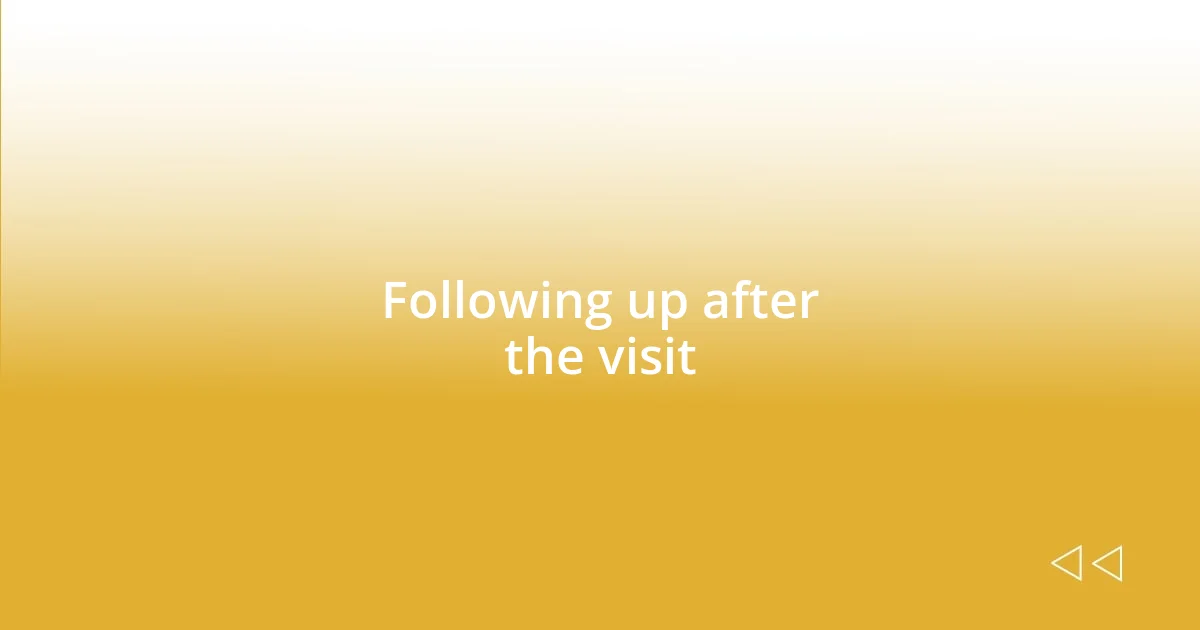
Following up after the visit
After a visit to the archive, I always feel a delightful mix of excitement and responsibility. I often find myself jotting down immediate reflections while the visit is still fresh in my mind. This practice not only reinforces what I learned but also helps me connect dots I may not have noticed during my exploration. Have you ever felt the urge to document your feelings right after a meaningful experience? Trust me, those initial reactions can later spark deeper insights when you revisit your notes.
Reaching out to archivists afterward has also become a vital part of my follow-up routine. One time, I followed up with an archivist about a particularly fascinating photograph I had come across. She was thrilled to share additional context that elevated my understanding of the image significantly. I often wonder how many layers of meaning might remain hidden without that simple gesture of connecting back. Do you think there are unseen stories waiting for you to uncover by just asking a question after your visit?
Lastly, I make a habit of sharing what I’ve learned with friends or family, as this not only reinforces my understanding but also ignites engaging conversations. I remember chatting with my cousin about an interesting letter I read regarding a family feud that added unexpected depth to our family narrative. It’s astonishing how these discussions can lead to new revelations or even inspire others to explore their roots. Have you shared your discoveries with someone close? Those interactive moments can turn personal history into shared journeys, weaving connections across generations.
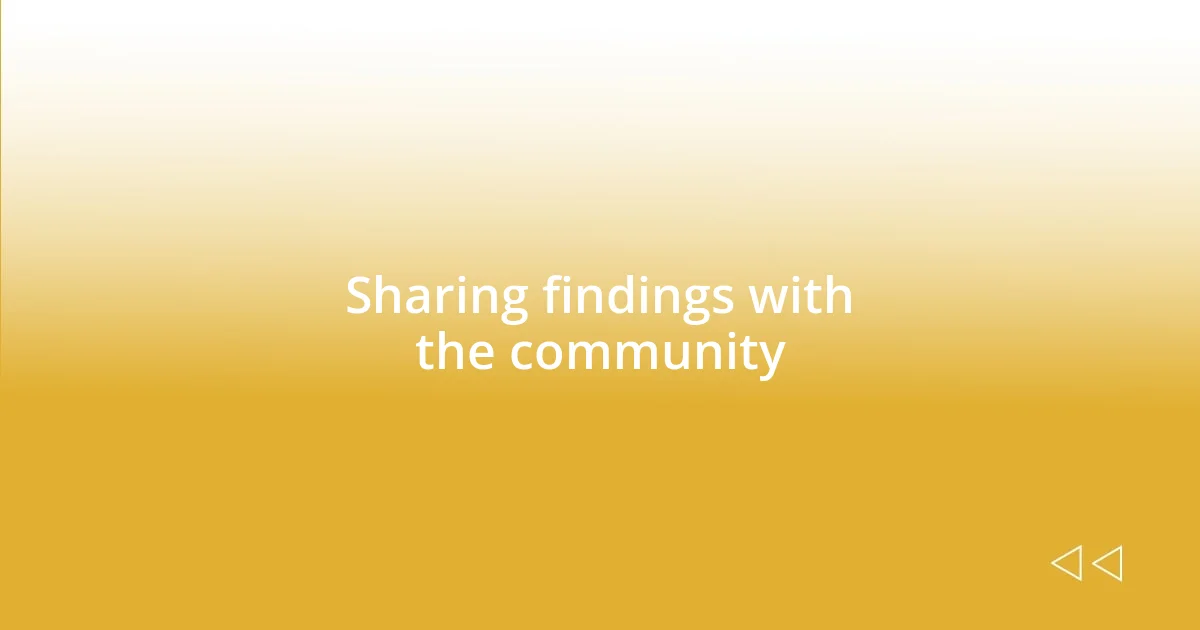
Sharing findings with the community
Engaging with the community after uncovering historical gems is one of the most rewarding aspects of conducting research in local archives. I vividly recall the thrill of presenting my findings at a community storytelling event. As I shared the stories behind a forgotten neighborhood, I could feel the excitement in the room. The audience’s laughter and gasps reminded me that history, while rooted in the past, is alive and resonates deeply with people’s experiences. Have you ever felt the power of sharing a story that suddenly connects with someone else’s life?
I also believe in the importance of creating easily accessible formats for sharing these discoveries. For instance, I once compiled a small booklet of insights and photographs from my archive visits and distributed it at a local library. The feedback was heartwarming; several members of the community expressed renewed interest in their own family histories and asked for tips on diving into archives themselves. This interaction made me realize that my passion could spark curiosity in others. Isn’t it fulfilling to think that your findings could inspire someone else to embark on their own journey?
Collaboration with local organizations can amplify the impact of our discoveries, too. I remember teaming up with a local history group to host an exhibition showcasing archival photographs juxtaposed with current images of the same locations. Walking through that exhibit, I felt a profound sense of connection as people shared their memories triggered by the images. It’s incredible how history not only documents our past but also creates bonds within the community. Have you considered how your findings could bridge gaps and foster connections among people with shared stories?
